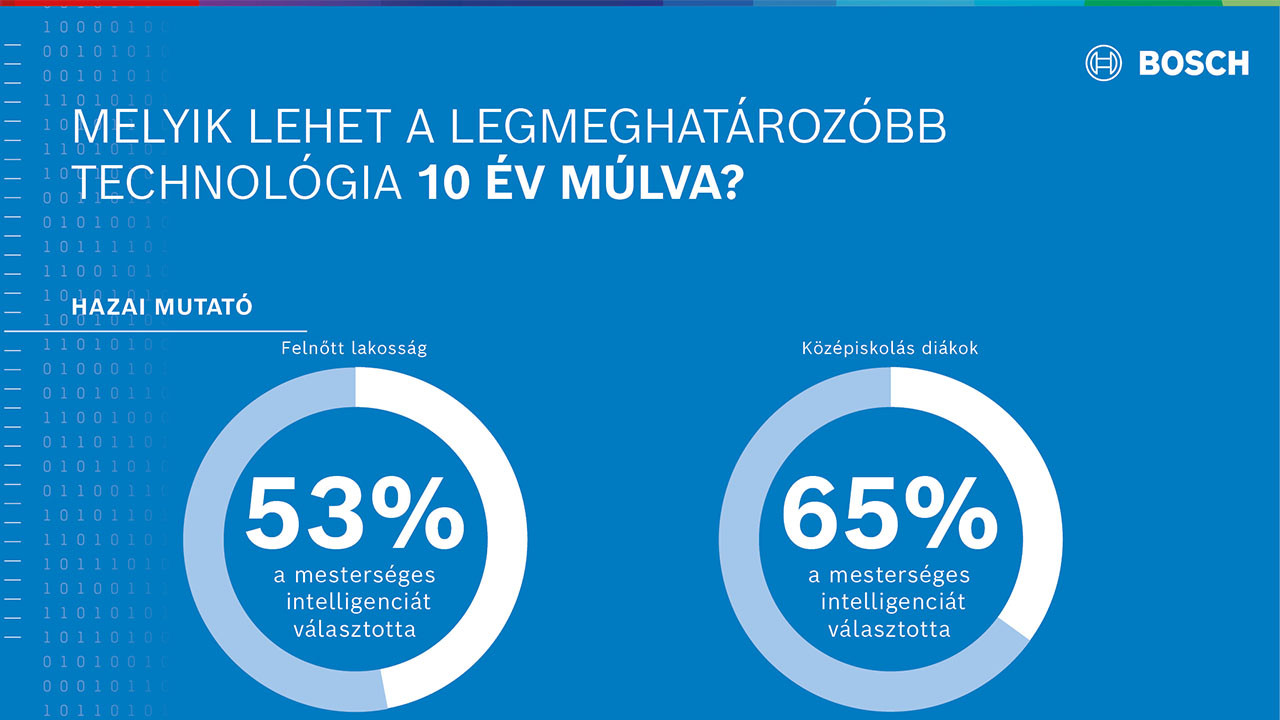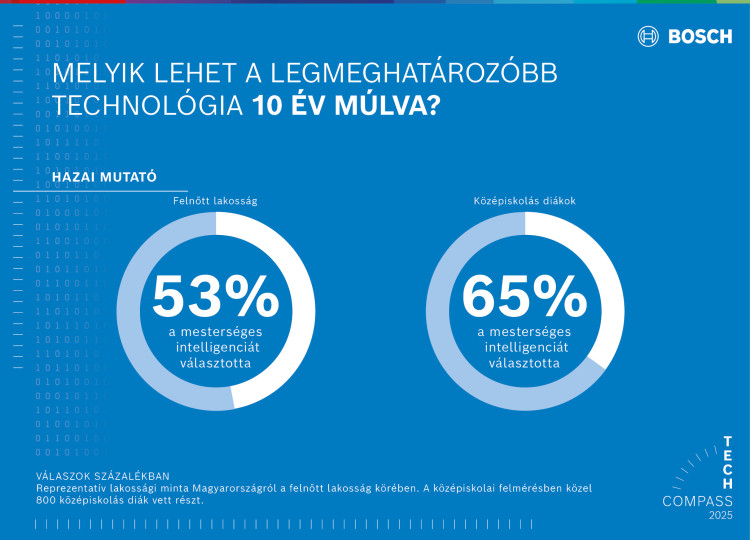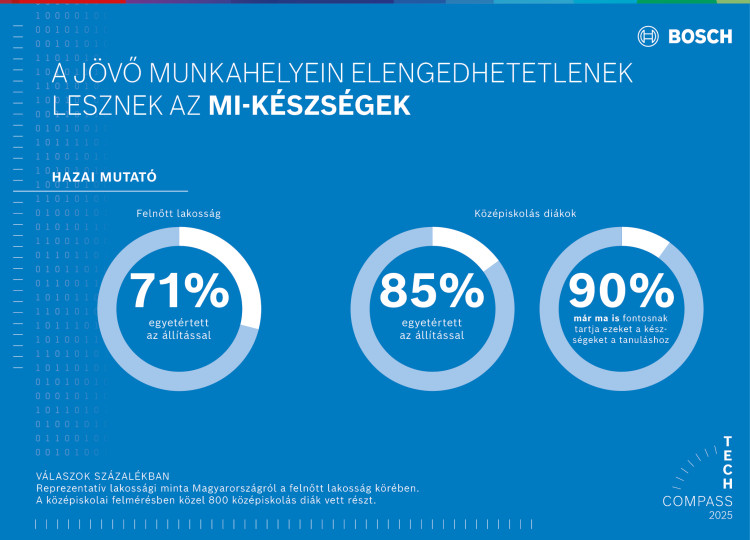Budapest – Artificial intelligence (AI) and technological development are viewed positively among Hungarian high school students. While the Bosch Tech Compass survey conducted in the fall of 2024 found that 53 percent of the adult population in Hungary believed artificial intelligence would be the most decisive technology of the next decade, 65 percent of the surveyed high school students agreed with this statement. In the spring of 2025, for the first time, students in secondary education were asked about: their attitudes toward technology, their expectations regarding new developments, and the opportunities they see in education. Nearly 800 students participated in the nationwide research.
Artificial intelligence is growing in importance
While 71 percent of adults, 84 percent of students believe that AI skills will be essential in the workplace of tomorrow. The survey also revealed that 90 percent of the students asked already consider these skills important for their studies today. Moreover, they are using AI tools more often. Whereas three-quarters of adult respondents do not use AI tools at work at all, less than a fifth of students said they never use such technologies for learning. Compared to adult respondents, four times as many high school students use these devices on a daily basis, and three times as many use them on a weekly basis. This dynamic shows that youngsters are more actively integrating AI-based solutions into their studies.
“The Bosch Group is building a comprehensive ecosystem in Hungary, which includes educating and raising awareness among students, including high school students, and strengthening the reputation of technical fields. We are committed to preparing the next generation, which is why we place special emphasis on developing AI skills and technological competencies,” said Teodóra Bodó, director of communication and governmental affairs of the Bosch Group in Hungary and the Adriatic Region.
Traditional knowledge versus AI skills
With the rise of artificial intelligence, traditional knowledge alone will no longer be sufficient. More than half of the adult population believes that in the future, in a world shaped by emerging artificial intelligence, traditional knowledge will become less important. This proportion is slightly lower for students, at 45 percent. The generations also differed in their views on whether AI should be taught as a standalone subject in schools: nearly two-thirds of adults, while less than half of the youth, agreed with this statement. However, more than half of respondents (54% among both age groups) support the use of AI-based virtual teachers for certain subjects.
According to the research, an outstandingly high proportion of students (84%) already plan to, in some way, incorporate artificial intelligence into their studies. Among adults, this figure is somewhat lower, at 75 percent. “This survey confirms the trend that younger generations approach artificial intelligence with greater enthusiasm and openness. Moreover, it demonstrates the importance of developing technological competencies not only in higher education institutions, but also already in secondary education,” added Teodóra Bodó.
About the study
In the spring of 2025, Opinion Institute Kft. interviewed nearly 800 high school students between the ages of sixteen and twenty. The national survey was commissioned by the Bosch Group in Hungary. At no point during the research was Bosch named as the commissioning party.
Mónika Hack
+36 70 510 5516
Bosch has been present in Hungary since 1898 with its products. After its re-establishment as a regional trading company in 1991, Bosch has grown into one of Hungary’s largest foreign industrial employers with currently nine subsidiaries. In fiscal 2024 it had total net sales of 2058 billion forints and consolidated sales to third parties on the Hungarian market of 313 billion forints. The Bosch Group in Hungary employs more than 17,400 associates (as of December 31, 2024). In addition to its manufacturing, commercial and development business, Bosch has a network of sales and service operations that covers the entire country.
The Bosch Group is a leading global supplier of technology and services. It employs roughly 418,000 associates worldwide (as of December 31, 2024). The company generated sales of 90.3 billion euros in 2024. Its operations are divided into four business sectors: Mobility, Industrial Technology, Consumer Goods, and Energy and Building Technology. With its business activities, the company aims to use technology to help shape universal trends such as automation, electrification, digitalization, connectivity, and an orientation to sustainability. In this context, Bosch’s broad diversification across regions and industries strengthens its innovativeness and robustness. Bosch uses its proven expertise in sensor technology, software, and services to offer customers cross-domain solutions from a single source. It also applies its expertise in connectivity and artificial intelligence in order to develop and manufacture user-friendly, sustainable products. With technology that is “Invented for life,” Bosch wants to help improve quality of life and conserve natural resources. The Bosch Group comprises Robert Bosch GmbH and its roughly 490 subsidiary and regional companies in over 60 countries. Including sales and service partners, Bosch’s global manufacturing, engineering, and sales network covers nearly every country in the world. Bosch’s innovative strength is key to the company’s further development. At 136 locations across the globe, Bosch employs some 87,000 associates in research and development.
Additional information is available online at www.bosch.hu, iot.boschblog.hu, www.bosch.com, www.iot.bosch.com, www.bosch-press.com, www.twitter.com/BoschPresse







